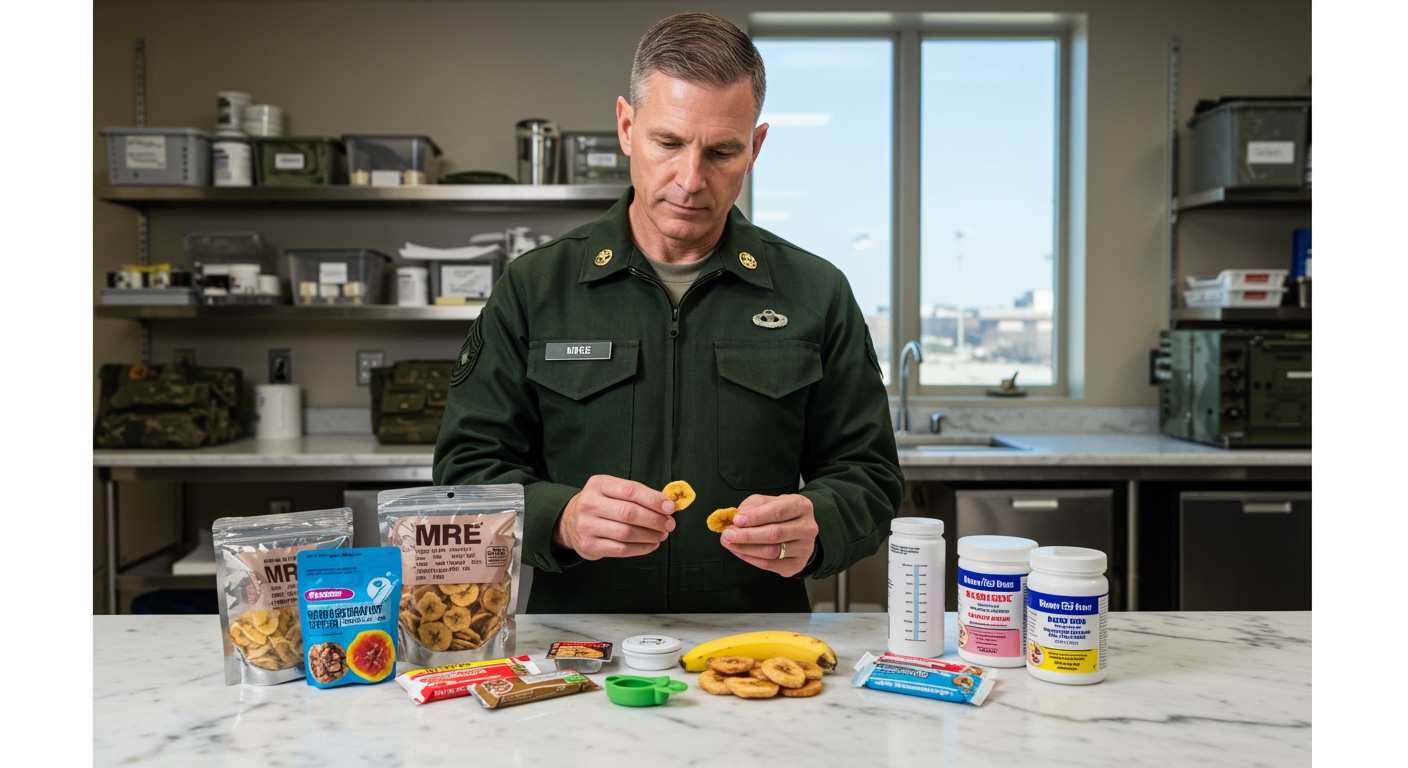✪ Key Highlight: U.S. Army selects banana chips for combat ration testing, marking major shift in military nutrition standards.
Introduction
The U.S. Army just made a decision that will change how we think about military nutrition forever.
They selected Cinnamon Churro Banana Chips from BranchOut Food Inc. for testing in their new Close Combat Assault Ration program in 2025.
Hi, I’m Abdur, your nutrition coach and today I’m going to analyze this groundbreaking development in military nutrition and what it means for combat feeding standards.
What Makes These Banana Chips Special For Combat?
The Army doesn’t choose foods randomly for their combat rations.
These banana chips passed strict shelf life and sensory validation trials that most foods fail.
BranchOut Food uses a patented technology called GentleDry that removes water while preserving up to 95 percent of original nutrition.
This process creates lightweight snacks that maintain their nutritional density for months without refrigeration.
The company holds more than 17 patents for this dehydration process, proving their commitment to food science innovation.
Traditional dehydration methods destroy many vitamins and minerals, but GentleDry preserves these essential nutrients that soldiers need for peak performance.
✪ Fact: Bananas provide quick energy from natural sugars plus potassium for muscle function during combat operations.
Why Is The Army Changing Combat Rations Now?
The Close Combat Assault Ration represents a complete shift from traditional military feeding strategies.
Unlike standard MREs that focus on calories, the CCAR prioritizes weight reduction and nutritional efficiency.
Small combat units need to carry everything on their backs for up to five days without resupply.
Every ounce matters when soldiers are moving fast through hostile environments where mobility determines survival.
The Army’s Combat Capabilities Development Command has been developing this program since 2019 to solve the weight versus nutrition challenge.
Traditional rations often sacrifice nutritional quality for shelf stability and convenience.
The CCAR program demands foods that deliver maximum nutrition in minimum weight while maintaining soldier preference for taste.
✪ Pro Tip: Apply military nutrition principles by choosing nutrient-dense, portable snacks for your active lifestyle.
How Does Military Food Testing Actually Work?
The Army’s food testing process is more rigorous than most people realize.
Foods must first pass laboratory shelf life tests that simulate months of storage in extreme conditions.
Next comes sensory validation where trained panels evaluate taste, texture, and overall acceptability after extended storage.
Only foods that pass these initial tests move to real-world field trials with actual soldiers.
Soldiers eat the foods during training exercises and provide detailed feedback about taste preferences and practical usability.
The Army collects data on how foods affect soldier performance, energy levels, and digestive comfort during missions.
This comprehensive testing ensures that only the most effective foods make it into official combat rations.
✪ Note: Military food testing standards exceed most commercial food safety requirements for durability and nutrition.
What Does This Mean For Future Military Nutrition?
This banana chip selection signals a major evolution in military nutrition philosophy.
The Army is moving beyond basic calorie delivery toward optimized nutrition that enhances soldier performance.
BranchOut Food has several other products under review for both CCAR and traditional MRE platforms.
This suggests the military wants to partner with companies that prioritize nutritional innovation over conventional food processing.
The success of these banana chips could open doors for more whole food-based options in military rations.
Soldiers deserve foods that not only sustain them but actually improve their physical and mental performance.
This shift toward functional nutrition in military settings could influence civilian food development and emergency preparedness strategies.
✪ Fact: Military nutrition research often leads to breakthrough innovations that benefit civilian health and food technology.
The Bottom Line
The Army’s selection of banana chips for combat ration testing represents a fundamental shift toward prioritizing nutritional quality in military feeding programs.
Smart nutrition choices matter whether you’re in combat or just living your daily life – the principles of nutrient density, portability, and sustained energy apply to everyone.
What are your thoughts on military nutrition standards, and do you think civilian emergency food supplies should follow similar quality requirements? Share your questions or opinions in the comments below.
References
At NutritionCrown, we use quality and credible sources to ensure our content is accurate and trustworthy. Below are the sources referenced in creating this article:
- StreetInsider: BranchOut Food product selected for U.S. Army field ration test
- U.S. Army: America’s tank division leads field ration testing mission
- NASDAQ: BranchOut Food Inc supplies Cinnamon Churro Banana Chips to US Army
- U.S. Army: DEVCOM Soldier Center transitions new individual field ration
- Military Health: USARIEM researchers creating better food rations for warfighters





